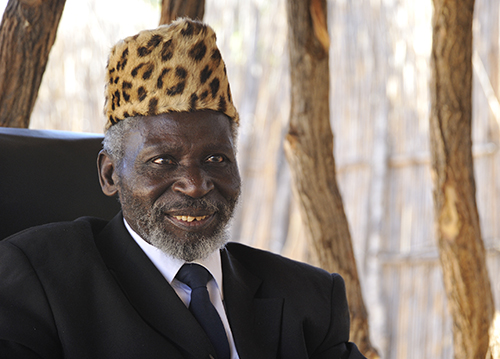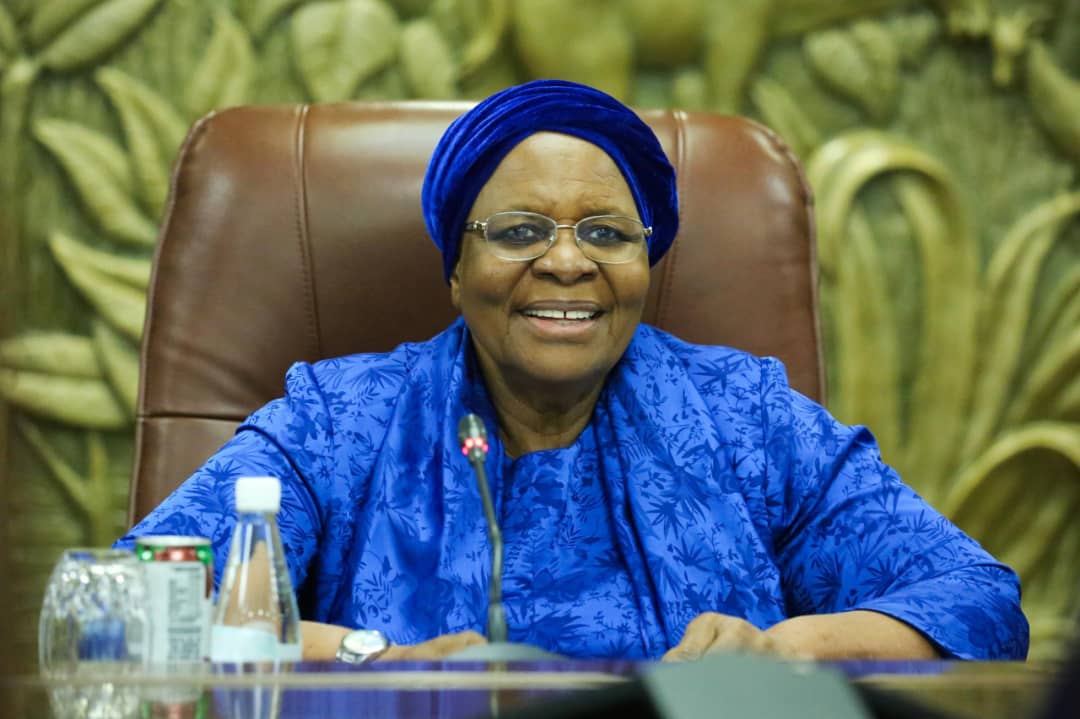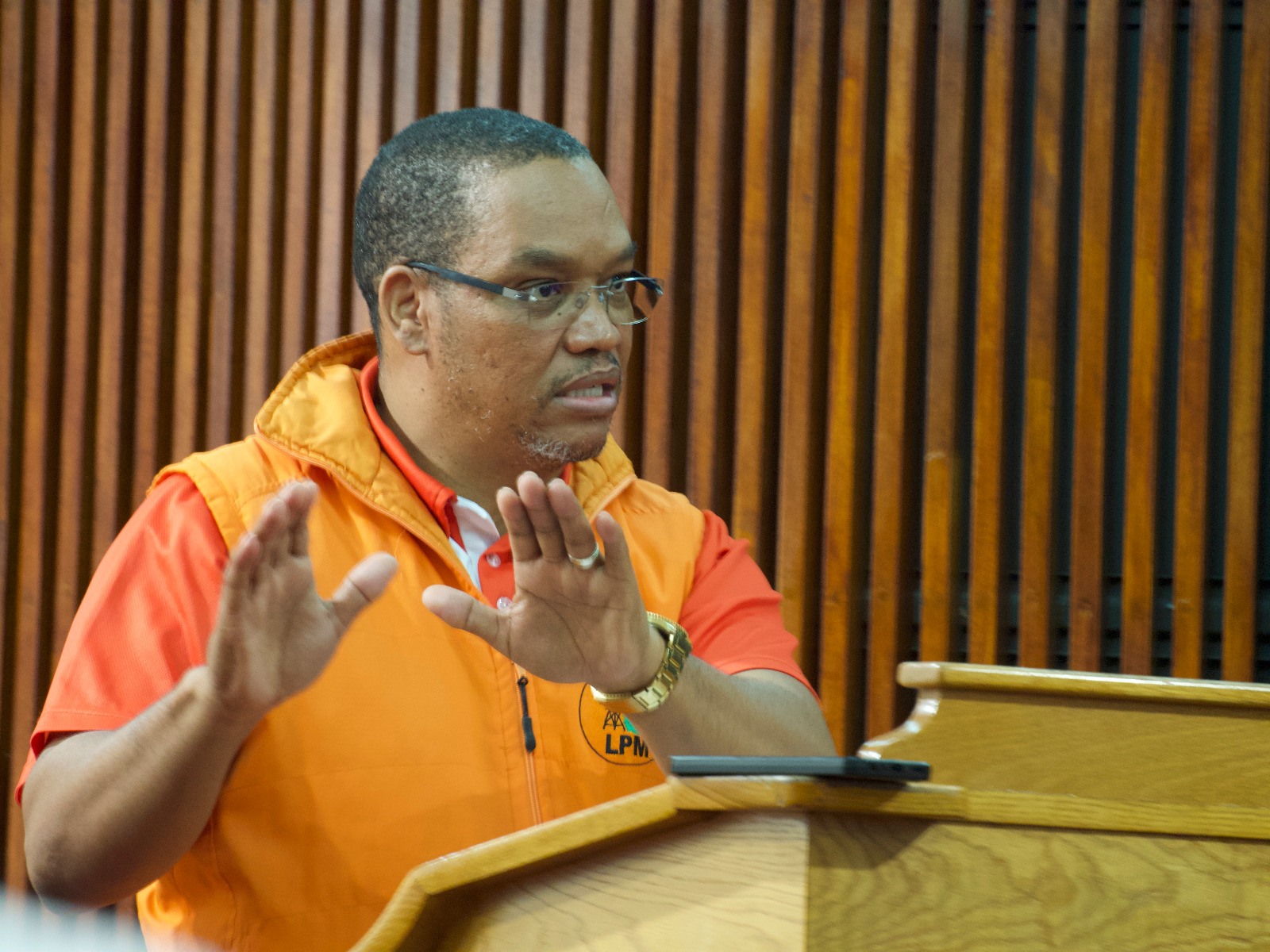STEVE FELTONIF there is a country that has taken the green movement to heart, it is Germany. Solar and wind power are replacing coal and nuclear. And the woods are protected.
Germany’s leading public service broadcaster, the Deutsche Welle, produces programmes on environmental themes under the title ‘Global Ideas’, which brought producer Jürgen Schneider to Namibia to report on how communal conservancies work together with the Namibian government and private sector to protect the environment; and how to deal with 20 000 elephants that inhabit Botswana, Namibia, Angola and Zambia, and regularly cross the Zambezi region of Namibia.
First stop for the film team was chief Mayuni’s palace. They were introduced by Bennety Likukela, who works for Integrated Rural Development and Nature Conservation (IRDNC). For the film, the introduction was perfect. You approach the chief on hands and knees, clapping respectfully. The setting is simple: a sofa and chairs under a thatched roof supported by poles. The chief sits at a desk, resplendent in leopard skin hat and with a fly whisk.
With all protocol observed, the chief settled in to chat with the film team. For the film crew, the issue of hunting was paramount. There are moves in the European Commission to ban the importation of hunting trophies into Europe, and similar calls have been made in the United States.
It is all about keeping wildlife on the land, which creates employment for the community, says the chief. Trophy hunting and tourism provide jobs and direct income to conservancies, which is used to compensate farmers for stock and crop losses, and to employ game guards in the fight against illegal hunting. So what would happen if trophy hunting were to stop?
In his opinion, stated Mayuni, banning hunting in Namibia would bring huge problems. His people would go back to square one, where people saw wildlife as the property of the state, and only as a threat. Now that the government has granted conditional rights over wildlife through communal conservancies, local people feel it is theirs, which is good, because although wildlife raids crops and livestock, people receive financial benefits from it. Mayuni pointed out that the community does not just go out and hunt. Strict quotas are set by the Ministry of Environment and Tourism for trophy hunting and meat harvesting.
Hunting, the German crew found out, has other conservation benefits. They paid a visit to Falko Schwartz, a professional hunter based in Dzoti conservancy, who had just testified in court against an alleged poacher he had caught. Over four years Schwarz had collected ballistic evidence, and finally cornered a man alleged to have shot 38 elephants. Schwarz pointed out that one legally harvested elephant may bring N$100 000 to a community, as well as the meat. Illegal hunting deprives the community of finance.
The film crew’s biggest worry was that they would not see elephants. Despite the size of the ‘grey giants’ as the Germans like to call them, elephants can be surprisingly elusive in the woods.
Even as the crew’s vehicle nosed through the woods along the narrow sand track towards Horseshoe Lake, where the Kwando River makes a bend almost, it seems, for the benefit of tourists, elephants were to be seen slipping gently through the trees. By sunset two small herds had gathered at Horseshoe to drink, much to the delight of a group of tourists staying at nearby Nambwa Lodge.
The new luxury lodge was also important for the film, because the five countries that have signed up to KAZA, the largest trans-frontier conservation area in Africa, are building a new economic model for the area: conservation based upon sustainable tourism. The Kavango Zambezi Trans Frontier Conservation Area, to give KAZA its full title, includes Angola, Zambia and Zimbabwe to the north, Botswana to the south, and Namibia at the axis of a conservation initiative that is removing wildlife fences and allowing elephants and other wildlife to migrate they always did.
Environment ministry chief warden for the area, Shadrack Siloka, took the crew to the Botswana border to show where the fence has been removed for a 70 kilometre stretch, making it possible for elephants and game to move without hindrance. The point was made on the return trip, with the engine overheating and the tyres churning through thick sand, a herd of over 100 elephants crossing in front of the vehicle to the cameraman’s delight, and if that wasn’t enough, did an encore on the way back, after drinking in the Kwando.
What does chief Mayuni think of elephants? He was asked.
“Living with wildlife is good”, says Mayuni, “because people from overseas come to view game, so we want to live together with wildlife, even though it brings conflict with humans”. But for the chief, there is a balance to be struck between farming and conservation. Between threats and benefits. “Banning hunting would take the community back to square one, with people having a negative opinion about wildlife”. In short, they would stop protecting it.
The film, For the Love of Elephants, can be viewed at:
http://www.dw.com/en/global-ideas-namibia-elephants-biodiversity-zimbabwe/a-18597112
Stay informed with The Namibian – your source for credible journalism. Get in-depth reporting and opinions for
only N$85 a month. Invest in journalism, invest in democracy –
Subscribe Now!










